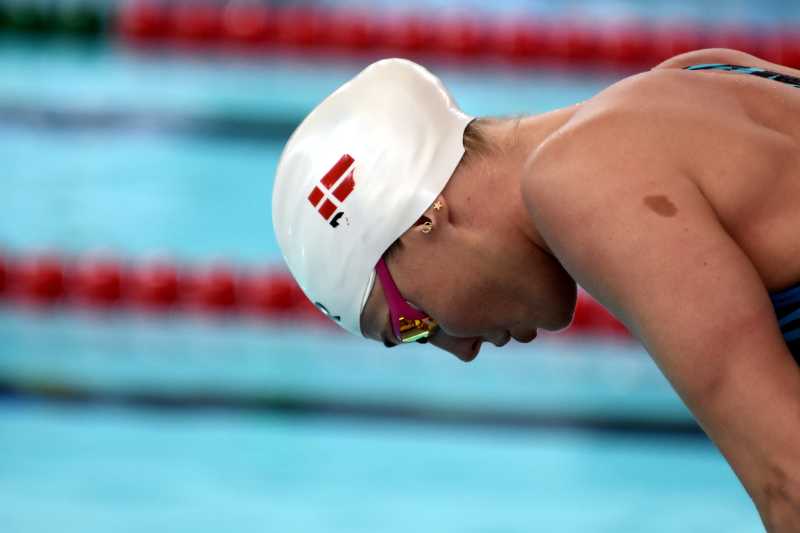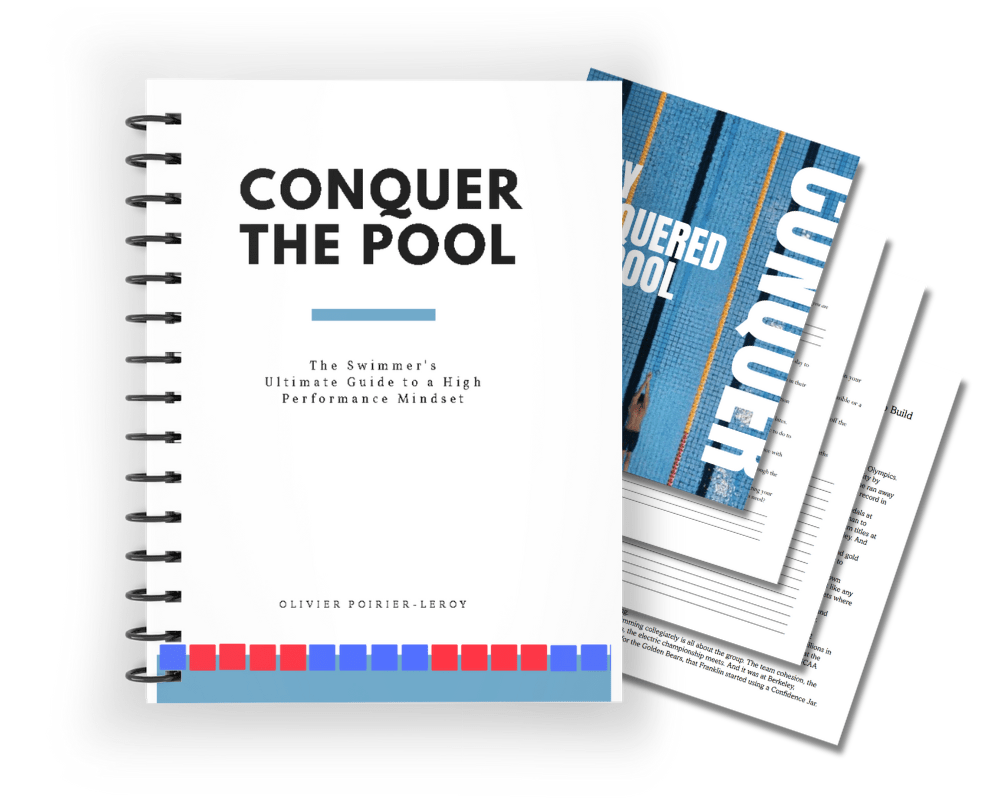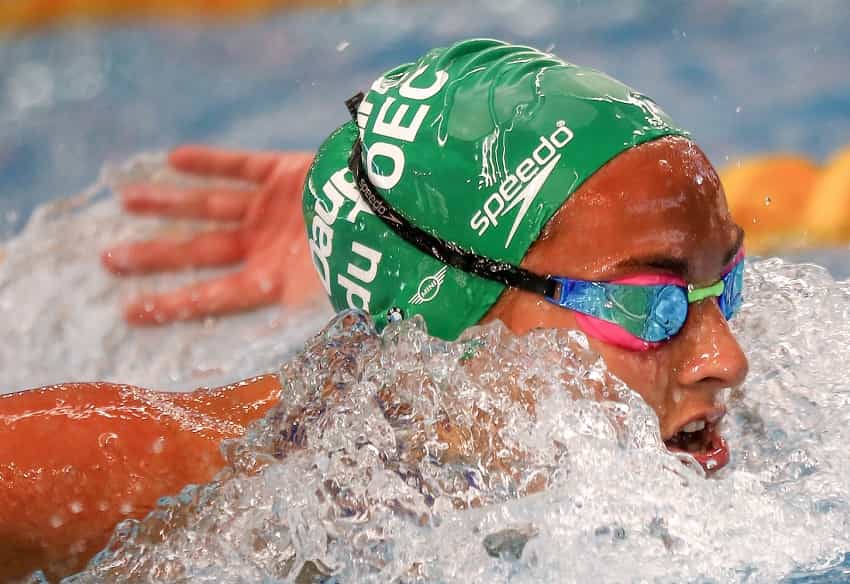Workouts and races are won with superior physical and mental preparation. Here’s how swimmers can start using mental training skills to improve performance in the pool.
A huge part of our sport is mental.
Whether it’s finding ways to persevere during hard sets, bouncing back after a bad practice, or managing pre-race nerves, how we perform largely comes down to the mindset we bring with us to the pool.
And yet, how much time do you spend trying to improve your mindset?
Sure, lots of you will think about your mindset:
- I wish I was mentally tougher…
- I wish getting up early for morning practice was easier…
- I wish I could get out of my own head when at practice…
But thinking about something isn’t the same as working to improve it.
Mental training skills matter more than you think
For just a moment, let’s bypass the whole “swimming faster” benefit of having better mental training skills. (Although, to be fair, one little study where swimmers used self-talk strategies showed that after two months they were out-improving their teammates by almost 1.5%.)
Let’s ignore how elite swimmers all use a variety of mental training skills to power their gold-medal winning swims, whether it’s Michael Phelps and his pre-race routine or Katie Ledecky reviewing her practices in a log book.
Let’s even skip past the whole being mentally tougher thing, which will help you throw down in the rest of your life, whether it’s having the discipline and focus to study or giving you tools to cope when your personal life is a five-alarm dumpster fire.
The big, greasy under-rated side to having sharp mental training skills is that you develop a healthier relationship with the sport.
Look:
Because you will better understand and appreciate the ups and downs, and be better equipped to deal with both, you won’t get as burned out, as frustrated, and as ticked off when things don’t go perfectly according to plan.
Improved mental training skills give you perspective, help you perform under pressure, and teach you to master your craft in the water.
When you go to the pool with a sharper and clearer mindset, training becomes less stressful and more, dare I say it, fun.
Combined, you will have a greater appreciation for the sport, and come to enjoy the process of training and racing a whole lot more.
Mindset is something you have control over
Swimmers are naturally result-focused. We train our butts off for weeks and months so that we can shave a fraction of a moment from our personal best time.
This relentless focus on the outcome can actually be counterproductive.
By spending our thoughts and energies worrying about the results, we ignore the opportunities we have for improvement today. More critically, the outcome is something we don’t always have control over. We don’t dictate what the other seven swimmers in the pool do—they are all there with the same expectation and hopes as us.
But your mindset is something you do have control over.
The mental habits and skills you use each day are being trained whether or not you realize it or even notice. Each day, as you lap up and down around the black line, your mindset is being developed in the same way as your technique and your conditioning.
You wouldn’t leave your technique and conditioning to chance, so why not be intentional about the kind of mindset you have when you walk onto the pool deck?
Why not choose the mental toughness you have, instead of letting your mindset fall by the wayside and fall to the circumstances of how you “feel” on any given day?
You choose the technique you swim with. You choose the effort you give. You choose the meals you eat (usually…). You choose to go to bed, or to stay up late playing around on your phone.
Why not choose the kind of mindset that you want to have in the water and behind the block?
Deploying mental training skills doesn’t mean something is wrong with you
When I hear from swimmers about their struggles, it’s usually in regards to some hazy, hard-to-perfectly-describe mental block that is keeping them from being successful.
They work hard, but when it comes to crushing it on race day, things collapse for them. They put in a big effort at practice, but don’t see the improvement they deserve. They do everything right, but collapse mentally under pressure.
You don’t need me to tell you how much this blows. You beat your swim workouts into submission for weeks on end, leaving your body wrecked and tired and constantly fatigued, only to get up on the blocks and swim a time that you’ve nearly done in practice?

It is as wasteful as it is frustrating.
Because the mental block is hard to perfectly describe (it’s not as easy to diagnose as say, not going to practice, or not doing the race pace times necessary in practice), it can leave you feeling hopeless, or like something is irreparably broken.
And because it’s something we don’t fully understand, we hesitate to reach out for help. We don’t want to look weak. We would rather suffer poor performances than admit that we need help sharpening what is happening between our ears.
Instead of viewing mental training skills as there being something wrong with you, look at it in the same way as you do the rest of your preparation.
👉 Mental training doesn’t mean something is wrong with you. It means you want to maximize the skills you already have. Instead of thinking of it as “fixing,” think of working on mental skills as putting fins and paddles on your mindset and swimming.
Mental training skills are technique and conditioning work for your brain.
They aren’t a band-aid or a first aid kit, but ways to enhance what you’ve already got. This distinction is important, because it takes mental training skills from trying to repair something to trying to build and develop something.
So where to start?
Based off of years of writing about this topic here on my blog, in my newsletter (with its readership of 29,000+ swimmers, coaches and parents), and the countless readers that frequent my columns for SwimSwam and USA Swimming, there are some simple things you can do to get started with sharpening your mindset.
The good news is that these steps don’t require a ton of time and effort, don’t require you to hire a sports psych, and they are things you can start doing today.
Let’s go:
1. Build the blueprint.
A successful mental training skills program starts by looking at where you are at, where you are strong, and where you want to improve. The best way to do this is to look through your own performance history.
Look over the past week of training. Think back to the mindset you had in practice.
Were you not as focused as you could have been? Did you find your concentration wavering during the main set?
Were you able to coach yourself to a max effort during the main sets? Did you ease into the hard stuff too much? Sammy Save-Up a little?
Look at where you did things really well.
What kind of self-talk did you use? What was your mindset like?
These are the keys to your mindset. You can read all day about how other swimmers do it, but there are some big hints in your own training and racing history about what works best in your specific case.
Think of it this way: Each swimmer has their own mental configuration for best performances. Some swimmers prefer to be calm, others angry, some like to get loud and boisterous, others stare dead-eyed across the pool all day.
We each have our own little blueprint for killer swimming.
What’s yours? What emotions are you feeling? What’s your self-talk? Where is your focus?
Write these down—think of them as the default settings for you kicking all the butts in the pool.
Once you have these listed, the rest of mental training and the skills you can use are all about helping you get into those states as much as possible.
2. Set short term goals to build on your strengths.
Mental training skills are just that… skills.
They aren’t a switch that you can turn on and off at will, they aren’t an overnight solution to your performance woes, and they aren’t something that can replace the other critical parts of your performance (sleep, nutrition, going to practice).
They are skills that require time and consistency to develop. With that in mind, set yourself daily/weekly mindset goals that feed into your broader mindset goals.
- Each Sunday I am going to write out a new mantra on my water bottle that will help keep me focused and motivated in practice.
- This week I am going to spend five minutes before each practice visualizing myself swimming with perfect technique.
- Before practice I will take two minutes to imagine myself overcoming the hardest set that coach has ever thrown at me, so that when the main set does come it will seem “easy.”
And so on. Set specific and actionable goals, make a plan, and follow through with them over time.
And how do we make sure that we follow through?
Great question—
3. How to keep yourself accountable
Okay, so we know what we want to work on, and we are going to set ourselves some short-term goals to get things rolling.
But how do we make sure that we stay consistent and on track?
How do we make sure that this isn’t a half-hearted attempt at getting mentally tougher that flames out after a couple days?
We stay on track by finding ways to measure the time and effort we are putting into our mental training skill.
The reality of training—whether it’s in the pool or in the weight room—is that we focus our energy on the stuff we can measure. If you can see precisely what you are doing, where you are improving, where you can be better, you are more likely to stick with trying to improve at it.
What you measure gets focused on. That’s about as simple a piece of advice as I can give you.
The problem with mental training skills is that they are difficult to quantify. How do you measure focus? How do you measure how positive your self-talk was? Or how you did visualization after practice and before bed?
Simple—the same way that you grade any other kind of effort or work you do at the pool.
Let’s say you want to spend more time emphasizing positive self-talk, because you know doing so will help you push through hard sets and keep you from getting too down on yourself when things don’t go perfectly.
After each workout, pop open the pages of your training journal and give yourself a simple rating or grade on your self-talk that day. Rank it on a scale of 1-5. Or smiley faces. Or blue stickers.
Similarly, you can pile up the reps of times where your mental game was strong by counting up how many meters you did with total focus. Or how many minutes you spent visualizing (“I did 12 minutes of visualization each day after practice, giving me 62 total minutes for the week.”)
Having these numbers gives you something to work with and improve on week over week.
Taking the next step
A lot of times swimmers will wait until their mindset is in tatters before reaching out for assistance with their mental skills.
And even then, many will simply choose to withdraw, fearing that by admitting they aren’t as sharp mentally as they’d like that they are weak or not deserving of the success they’ve worked so hard for.
Which is flat-out wrong.
Instead of looking at mental training skills as an indication that there are loose screws between your ears, view them as a weapon for faster swimming.
In the same way that a cleaner diet, better sleeping habits, and improved technical efficiency can help you swim better, just a little attention and focus spent on improving your mental game can pay big dividends for you in the water.
Ready to take your mental game to the next level?
Swimmers frustrated with underwhelming performances on race day and want to conquer their mindset will love Conquer the Pool: The Swimmer’s Ultimate Guide to a High-Performance Mindset.
Written with the feedback of 200+ Olympians, NCAA champions, and head coaches, the book is the complete blueprint for an unbeatable mindset in practice and training.
From learning how to build a killer pre-race routine to everything you’ll ever need to master pre-race nerves, Conquer the Pool gives swimmers the tools to swim with total confidence on race day.















